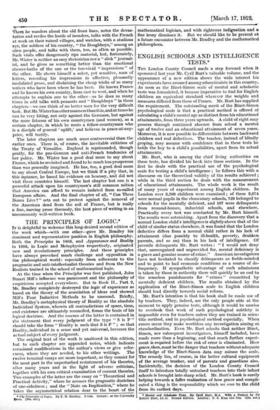THE PRINCIPLES OF LOGIC.*
IT is delightful to welcome this long-desired second edition of the work which—with one other—gave Mr. Bradley his dominant and representative position in English philosophy. Both the Principles in 1888, and Appearance and Reality in 1893, in Logic and Metaphysics respectively, originated new and revolutionary principles. And these principles have always provoked much challenge and opposition in the philosophical world : especially from adherents to the pragmatic and anti-intellectualist theories and from the New Realists trained in the school of mathematical logic.
At the time when the Principles was first published, John Stuart Mill's influence was paramount and the philosophy of empiricism accepted everywhere. But in Book IL, Part 2, Mr. Bradley completely destroyed the logic of experience as based on the theory of the association of ideas and showed Mill's Four Inductive Methods to be unsound. Briefly, Mr. Bradley's metaphysical theory of Reality as the absolute Individual System, wherein all contradictions of space, time, and existence are ultimately reconciled, forms the basis of his logical doctrine. And the essence of the latter is contained in the statement that every judgment of the type " S is P " should take the form " Reality is such that S is P " ; so that Reality, individual in a sense and yet universal, becomes the actual subject of every judgment.
The original text of the work is unaltered in this edition, but to each chapter are appended notes, which indicate occasional modifications in the author's views or give refer- ences, where they are needed, to his other writings. The twelve terminal essays are more important, as they consist for the most part in the unperturbed restatement of his theories, after many years and in the light of adverse criticism, together with his own critical examination of current theories. Two examples of the latter are the essay on " Theoretical and Practical Activity," where he accuses the pragmatic doctrines of one-sidedness ; and the " Note on Implication," where he takes the asymmetrical relation dear to the heart of the • The Principles of Logic, By F. H. Bradley. 2 vole. Oxford : at the University Ursa. ID6a. net.4
mathematical logician, and with righteous indignation and a fine irony dismisses it. But we should like to be present at a future encounter between Mr. Bradley and the mathematical philosophers.










































 Previous page
Previous page